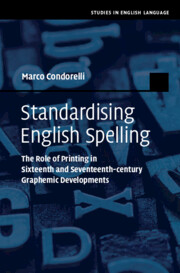 Standardising English Spelling
Standardising English Spelling from Part II - Empirical Method
Published online by Cambridge University Press: 31 March 2022
Chapter 6 reports on some foundational tests conducted prior to pursuing my case studies. For the exploratory work, searches were conducted on <i>/<j>, <u>/<w> and <w>/<wh>, using all of the parameter options explained in the previous chapter. A case is made for explaining why these variants represent a suitable subject for my foundational explorations, quantitatively and qualitatively. My results indicate that not all graphemes are relevant for a given analysis of a spelling unit, most often because of complex language-internal constraints. Statements like these can be made confidently on the basis of the extensiveness of the EModE vocabulary database, against which judgements about variation are made. The chapter then investigates possible challenges in automatic analyses of spelling development by investigating semantic ambiguity in <u> and <w>, and discusses results which suggest an independence of spelling from word meaning. The results discussed are important for an assessment of the extent to which the new empirical method can be used reliably in current and future research work, and provide an encouraging outcome.
To save this book to your Kindle, first ensure no-reply@cambridge.org is added to your Approved Personal Document E-mail List under your Personal Document Settings on the Manage Your Content and Devices page of your Amazon account. Then enter the ‘name’ part of your Kindle email address below. Find out more about saving to your Kindle.
Note you can select to save to either the @free.kindle.com or @kindle.com variations. ‘@free.kindle.com’ emails are free but can only be saved to your device when it is connected to wi-fi. ‘@kindle.com’ emails can be delivered even when you are not connected to wi-fi, but note that service fees apply.
Find out more about the Kindle Personal Document Service.
To save content items to your account, please confirm that you agree to abide by our usage policies. If this is the first time you use this feature, you will be asked to authorise Cambridge Core to connect with your account. Find out more about saving content to Dropbox.
To save content items to your account, please confirm that you agree to abide by our usage policies. If this is the first time you use this feature, you will be asked to authorise Cambridge Core to connect with your account. Find out more about saving content to Google Drive.